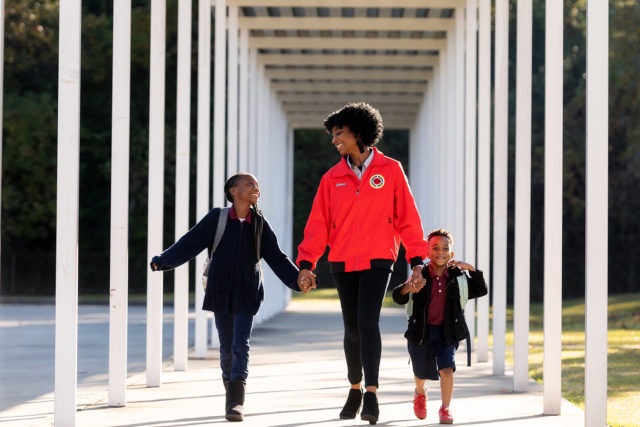Relationships: critical for student success

By now it’s become apparent that the COVID-19 pandemic is having a disproportionate, devastating impact on marginalized communities, specifically people of color who face systemic inequities that shape health, economic and educational outcomes. Yet COVID has shone a bright light on something else, too: the centrality of consistent, caring adult relationships to students’ learning and development.
In recent years, converging findings from the science of learning and development– as articulated by The Science of Learning and Development (SoLD) Alliance and the National Commission on Social, Emotional, and Academic Development — confirm what many educators have long known: learning must be supported by strong, trusting relationships in and out of the classroom. Positive relationships between students and caring adults are central to establishing good mental and emotional health, achieving academic success, fostering social connections, and developing neural processes that enable students to be resilient, effective learners.
A new study by the Everyone Graduates Center at Johns Hopkins University on City Year’s evidence-based approach to supporting students and schools found that students’ social-emotional growth is tied to their academic growth. The more support a student receives from a City Year AmeriCorps member, who serves as a Student Success Coach (SSC), the better the student’s social-emotional, academic (grades and test scores) and attendance outcomes.
As a result of the pandemic, one priority for educators will be helping students readjust and combatting learning loss. The science of learning and development shows us that a critical step in fostering learning loss is ensuring all students have strong relationships and connections in their school community.
Developmental relationships are not a “nice to have.” They are essential to learning in all schools. Any effort to address learning loss that doesn’t also ensure that every student is supported by a strong network of developmental relationships is a waste — of time, of money and of our students’ potential.
This fall, many school systems could benefit from additional adults who work alongside teachers to provide students with these relationships for learning. This means schools will require increased resources and capacity — especially schools in neighborhoods that have been historically under-resourced.
We can make this happen by putting into practice what we know from the science: we can recruit and train Student Success Coaches to serve in schools and expand student access to a web of caring and consistent relationships. SSCs are young adults who serve full time in public schools to provide students with holistic support — such as tutoring, mentoring and helping students stay focused in class — and help teachers to create welcoming and safe learning environments, including through school-wide events and afterschool programs. They are trained in delivering evidence-based supports to students to help them feel confident, explore their interests and achieve at high levels. And as near-peer role models, SCCs are powerfully positioned to build the positive, developmental relationships that are and have always been the bedrock of student success.
National service is an effective and cost-efficient method to add dedicated resources to schools that advance student holistic growth and success — like SSCs. Examples of organizations that are showing the value of SSCs include national programs like City Year and local programs such as the Minnesota Alliance with Youth’s Promise Fellows and PartnerCorps: STEM at Berea College in Kentucky.
As a nation, we make progress when we unite around a common purpose and when we take an entrepreneurial and evidence-based approach in using our resources. It is time once again for that ethic to take hold. During the 25-year history of AmeriCorps, one of the biggest takeaways is that there are thousands of diverse, young adults who want to step up and serve their country and their communities. Young adults are choosing service because they believe that when students rise, we all rise.
The good news is there is already a pathway for states to support national service. In California, lawmakers are seeking to expand student access to developmental relationships and holistic supports. Assembly Bill 2533 would establish the California Student Success Coach Program, which would award competitive grants to local and state-operated AmeriCorps programs so that more high-need schools could sustain and grow SCCs.
Let’s commit to work together — families, educators, policymakers, researchers and funders — to bring the science of learning and development to life in our schools so that every student can thrive.
Learn more about City Year’s impact and share a new practitioner guide, What City Year is learning about the power of integrating social, emotional and academic development in public schools: A guide for practitioners and policymakers, that highlights tools from several organizations, including CASEL, Search Institute, PERTS Lab at Stanford University and PEAR: Partnerships in Education and Resilience.
Jim Balfanz is the CEO of City Year and a Science of Learning and Development Alliance advisory committee member.
Bethany Little is a principal at EducationCounsel and a member of the Science of Learning and Development Alliance.
A version of this essay was first published June 9, 2020 on Medium.
Related stories
Yes, the holiday season can be stressful—making travel plans, wrapping up work before winter break, figuring out what gifts to...
Read more about Three reasons students may be thankful for their student success coachEvery year, thousands of young people decide to join AmeriCorps programs for a year (or more!) of service, helping to...
Read more about Everything you need to know about returning for another year as a City Year AmeriCorps memberCity Year is committed to providing our AmeriCorps members with resources, opportunities and support that help them to achieve their...
Read more about Empowering Futures: City Year Baton Rouge’s Partnership with Bottom LineFatimah Abdulmateen takes service seriously. Fatimah served two years with City Year as an AmeriCorps member, making her an alum...
Read more about A City Year alum with a passion for service—both here and abroad















